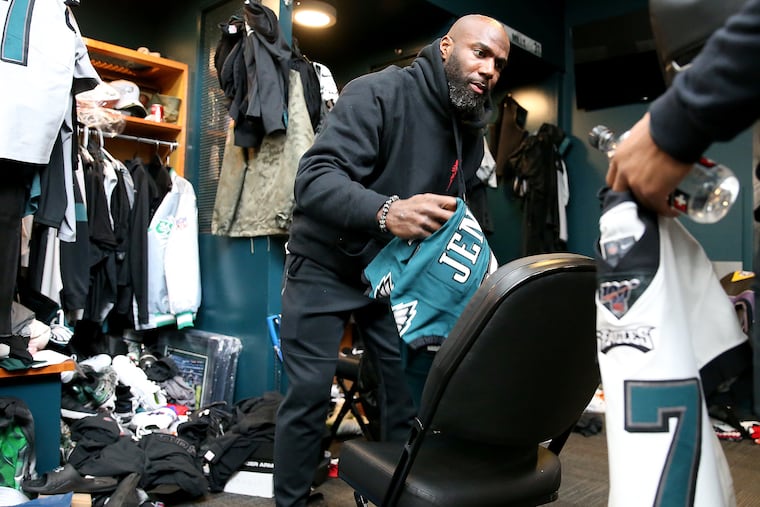Ex-Eagle Malcolm Jenkins pens love note to Philly, but if departure wasn’t about money, why is he gone?
It seems likely that as much as Jenkins might have wanted to stay, he grew weary of his deal not being prioritized here, and at some point, he had decided it was time to move on.

Malcolm Jenkins praises Philadelphia fans and talks about how hard it is to leave in a piece the former Eagles safety penned for The Players Tribune. But the proud reflections, and the warm memories Jenkins evokes about his six-year run as the leader of the Eagles’ secondary only make it harder to understand why he’s back with the New Orleans Saints now if he indeed “sincerely never wanted to leave Philadelphia” and “money has NEVER been my motivator."
Jenkins, 32, writes about how important his legacy is to him, says that establishing and maintaining that legacy is why he ran downfield so hard on punt coverage teams in his 11th NFL season. “It’s not because I want extra money -- it’s because I want to be known as someone who will give it all to his team in order to win,” he wrote. He says a similar drive, a sense of responsibility “as someone who stands on the shoulders of those who came before me” motivates his social justice work.
“Maybe one day in the future when I’ve hung up my cleats, I can be in the company of Eagles greats."
All of this rings true to fans who watched him play every down, and who watched Jenkins work tirelessly in the community since coming to Philadelphia from the Saints as a 2014 free agent. But for many fans, still in shock over the Eagles’ decision to not exercise the 2020 option in his 2016 contract, under which Jenkins said he wouldn’t play, the main question is why a key leader of the Super Bowl LII team had to leave. This goes unanswered.
“And it’s no secret that I wanted a new deal — no secret that I felt like I deserved one,” Jenkins wrote. “Not so I could be the highest-paid player at my position (even though I regard myself as being of that caliber), but so I could cement my legacy in Philadelphia forever. I wanted a deal that showed me my sacrifices to the game have been recognized. I’m no idiot. I know money is tied to timing, market value, age, the draft, and so on. But legacy? That’s tied to the player, and to the name on the back of his jersey.
“Unfortunately, for whatever reason, I wasn’t able to ensure that my name would end up on the back of an Eagles jersey this year.”
Jenkins then talks about how he hopes his legacy here will endure and “maybe one day in the future when I’ve hung up my cleats, I can be in the company of Eagles greats."
Jenkins also makes a point of thanking “Mr. Lurie, Coach Pederson, Jim Schwartz and the rest of the coaching staff,” after his original farewell on social media did not include any coaches.
Still absent in either thank-you is the name of Eagles general manager Howie Roseman, which does not seem to be an accident.
It’s been nearly a year since Jenkins went public with his desire for a new contract. He sat out OTAs but returned to the fold for mandatory work after meeting with owner Jeffrey Lurie and being reassured of his importance to the team. But no contract was forthcoming. When the Eagles cleaned out their lockers after the wild-card round playoff loss to Seattle, Jenkins made it clear he wasn’t interested in playing in 2020 for the $7.685 million he was due to make.
There were reports that Jenkins wanted $12 million to $14 million a year from the Eagles. Then he signed with the Saints for four years and $32 million, with $16.5 million fully guaranteed. You don’t need to be a math whiz to notice that the Saints deal is not for $12 million to $14 million a year.
It seems likely that as much as Jenkins might have wanted to stay, he grew weary of his deal not being prioritized here, and at some point, maybe even by the time he issued that final edict on cleanout day, he had decided it was time to move on. And it’s very clear that while the Eagles might have offered Jenkins a face-saving tweak or two, they didn’t offer to guarantee $16.5 million over the next couple years.
After the way 2019 unfolded, Roseman wanted a younger and cheaper roster, and he wanted to change up the leadership group, as is apparent in his willingness to part with Jenkins and nine-time Pro Bowl left tackle Jason Peters. When free agency arrived, Jenkins might have figured he had a better shot at winning another Super Bowl — further burnishing that legacy — with a team that finished 13-3 each of the past two seasons.
New Orleans drafted Jenkins in the first round in 2009, and Saints coach Sean Payton regretted ever letting him walk in free agency. The Saints made it clear to Jenkins that he could be a vital part of their team going forward. The Eagles, apparently, did not.